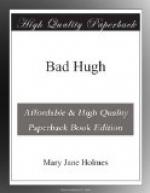Meantime Alice and Densie proceeded on their way to the Big Spring station, where Colonel Tiffton was waiting for them, according to his promise. There was a shadow in the colonel’s good-humored face, and a shadow in his heart. His idol, Nellie, was very, very sick, while added to this was the terrible certainty that he and he alone must pay that $10,000 note on which he had foolishly put his name, because Harney had preferred it. He was talking with Harney when the cars came up, and the villain, while expressing regret that the colonel should be compelled to pay so much for what he never received, had said, with a relentless smile: “But it’s not my fault, you know. I can’t afford to lose it.”
From that moment the colonel felt he was a ruined man, but he would not allow himself to appear at all discomposed.
“Wait a while,” he said; “do nothing till my Nell lives or dies,” and with a sigh as he thought how much dearer to him was his youngest daughter than all the farms in Woodford, he went forward to meet Alice, just appearing upon the platform.
The colonel explained to Alice why she must go to Spring Bank, adding, by way of consolation, that she would not be quite as lonely now Hugh was at home.
“Hugh at home!” and Alice shrank back in dismay, feeling for a moment that she could not go there.
But there was no alternative, and after a few tears, which, she could not repress, she said, timidly:
“What is this Hugh? What kind of a man, I mean?”
She could not expect the colonel to say anything bad of him, but she was not prepared for his frank response.
“The likeliest chap in Kentucky. Nothing dandified about him, to be sure. Wears his trouser legs in his boots as often as any way, and don’t stand about the very latest cut of his coat, but he’s got a heart bigger than an ox—yes, big as ten oxen! I’d trust him with my life, and know it was just as safe as his own. You’ll like Hugh—Nell does.”
The colonel never dreamed of the comfort his words gave Alice, or how they changed her feelings with regard to one whom she had so dreaded to meet.
“There ’tis; we’re almost there,” the colonel said at last, as they turned off from the highway, and leaning forward Alice caught sight of the roofs and dilapidated chimneys of Spring Bank. “’Taint quite as fixey as Yankee houses, that’s a fact, but we that own niggers never do have things so smarted up,” the colonel said, guessing how the contrast must affect Alice, who felt so desolate and homesick as she drew up in front of what, for a time at least, was to be her home.
“Where is Hugh?” Alice asked.
Aunt Eunice would not say he had gone to Lexington for the sake, perhaps, of seeing her, so she replied:




